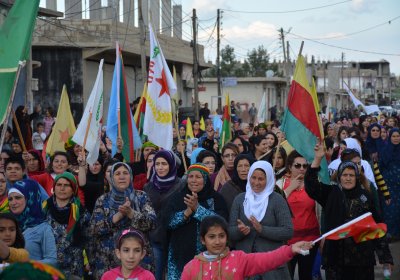Venezuelan President Nicolas Maduro at a demonstration in support of the government's emergency economic measures emergency measures, Caracas, May 14. Photo via AVN.
1097
The reverberations. Not the rumbles, the reverberations. The death of Muhammad Ali will undoubtedly move people's minds to his epic boxing matches against Joe Frazier, George Foreman, or there will be retrospectives about his epic “rumbles” against racism and war.
But it's the reverberations that we have to understand in order to see Muhammad Ali as what he remains: the most important athlete to ever live. It's the reverberations that are our best defense against real-time efforts to pull out his political teeth and turn him into a harmless icon suitable for mass consumption.
Sitting safely inside the head of a pale, grey telebot, slowly gyrating in an attempt to be innocuous; it turned to face the audience, introducing itself as Edward Snowden — the Worlds Most Wanted Man.
Indigenous communities representing various nationalities marched through the streets of Caracas on June 2 to show their support for the government of Nicolas Maduro and Venezuela’s Bolivarian Revolution.
The groups taking part in the demonstration were responding to a call made by the government to develop grassroots solutions to the economic crisis the country is facing.
When I began full-time work in the late 1980s, the working day began and ended at the same time every day. Any change to the routine meant overtime, paid at time-and-a-half or more. Even a delay in the regular lunch break meant overtime paid until the work stopped.
Now, for many, overtime payments are a thing of the past and Patricia Forsyth and the Sydney Chamber of Commerce want to make the working day even more “flexible” — but at whose expense?
Rafael “Rafucko” Puetter is a Rio-based artist and activist who put together an “Olympic anti-souvenir shop” to highlight the injustices that arrive with the summer games.
 Chief minister of the Northern Provincial Council, CV Wigneswaran, addressing a commemorative event at Mullivaikkal, May 18. Photo: Tamil Guardian.
Tamils throughout the north and east of the island of Sri Lanka held ceremonies on May 18 to remember those who died in the genocidal war waged by the Sri Lankan Army against the Tamil people.
Chief minister of the Northern Provincial Council, CV Wigneswaran, addressing a commemorative event at Mullivaikkal, May 18. Photo: Tamil Guardian.
Tamils throughout the north and east of the island of Sri Lanka held ceremonies on May 18 to remember those who died in the genocidal war waged by the Sri Lankan Army against the Tamil people.
 I just returned to the United States from Rio de Janeiro, where I was researching a story on the Olympics in August for The Nation.
People spoke to me about the displacement and police violence that are accompanying the games. Yet one of the hottest points of discussion emerged from outside the country: a call to move, or at least postpone, the Olympics to prevent the global expansion of the Zika virus, currently exploding in Rio.
I just returned to the United States from Rio de Janeiro, where I was researching a story on the Olympics in August for The Nation.
People spoke to me about the displacement and police violence that are accompanying the games. Yet one of the hottest points of discussion emerged from outside the country: a call to move, or at least postpone, the Olympics to prevent the global expansion of the Zika virus, currently exploding in Rio.
 The Queensland government moved a motion on May 26 that the Health, Communities, Disability Services and Domestic and Family Violence Prevention Committee is to report back to state parliament on the Abortion Law Reform (Woman's Right to Choose) Amendment Bill 2016 by August 26.
The Queensland government moved a motion on May 26 that the Health, Communities, Disability Services and Domestic and Family Violence Prevention Committee is to report back to state parliament on the Abortion Law Reform (Woman's Right to Choose) Amendment Bill 2016 by August 26.
I was sitting in the waiting room when you flashed across the screen
A heatwave smothered India and you were on the scene.
As you tried to cross the street, your shoe stuck to the road
So you ran on scorched bare feet, as the black tar slowly flowed.
Where there once were straight white lines, a crazy pattern morphed and swirled,
As if a giant with a paintbrush splashed out and dwarfed the world.
You long for cooling rain, but the monsoon will be late.
And this is how some people face their climate fate.
You’re a woman of Maharashtra; farm life is what you know.
 United We Can.
United We Can — the united ticket made up of Podemos, the United Left, the green party Equo and three broader alliances in Catalonia, Galicia and the Valencian Country — is campaigning in the June 26 Spanish general elections on a plan to reverse economic austerity.
United We Can.
United We Can — the united ticket made up of Podemos, the United Left, the green party Equo and three broader alliances in Catalonia, Galicia and the Valencian Country — is campaigning in the June 26 Spanish general elections on a plan to reverse economic austerity.
The Syrian Kurds and allied communities declared their areas the “Federation of Northern Syria and Rojava” on March 17, and announced that democratic federalism is a viable alternative to the detrimental politics of both the Syrian regime and the jihadist opposition.
- Page 1
- Next page






